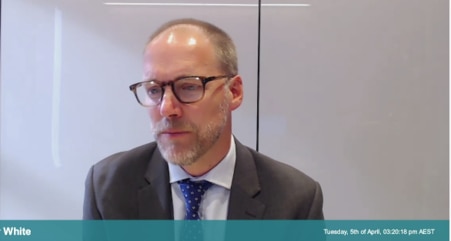Star Entertainment’s China loans ‘massive credit risk’
The ASX-listed gaming company loaned money to Chinese gamblers via its subsidiary EEIS, despite legal advice warning they might not be enforceable.

Star Entertainment lent cashed-up Chinese gamblers money via a Hong Kong subsidiary, despite external legal advice warning that the loans may not be enforceable, exposing a “massive credit risk”, an inquiry has heard.
The loans from Star subsidiary, EEIS, allowed patrons to distance themselves from Australian casinos, with their account statements showing that they were borrowing money from a Hong Kong money lender rather than repaying gambling debts.
Gambling in China is illegal and the EEIS loans began after the Bank of China closed Star’s accounts in Macau as part of a broader crackdown on foreign casino operators in late 2017.
While Star general counsel Oliver White conceded it was an “advantage” for Star patrons to have EEIS listed on their bank statements, rather than Star, he said it was not the “key driver”.
“My recollection is that the key driver was the location of the bank account would make it easier for the customers to repay into Hong Kong,” Mr White said in his third-day of giving evidence at a royal commission-style inquiry.
Star proceeded with granting five Chinese gamblers – including junket funders – interest free and no collateral loans via EEIS, despite receiving external legal advice from Hong Kong law firm King & Wood Mallesons that they might not be enforceable.
Counsel assisting the inquiry Naomi Sharp SC asked Mr White if that was a “massive credit risk” to Star.
“Looking at it now, I agree with you,” Mr White said.
Ms Sharp said: “Is it the case that what the Star was doing was assisting patrons by making available to them an alternative payment channel so that it did not appear that patrons were making payments to a casino?”
Mr White said: “I suppose that could be the case”.
EEIS, which currently lists former Star chief executive Matt Bekier and chief financial officer Harry Theodore as directors, was also entirely supported by Star.
Ms Sharp asked Mr White if he sought legal advice that the loans did not contravene NSW laws banning the provision of credit to gamblers, which changed for international players in July 2020.
“Can’t be certain. Believe we did,” he said.
Earlier on Thursday, Mr White said he used “industry jargon” to mislead Star’s banker NAB and China Union Pay and “obfuscate” almost $1bn worth of Chinese debit card gambling transactions, which Star had disguised as hotel charges.
In 2019, following questions from NAB on behalf of China Union Pay about high sums of money appearing on hotel receipts, with the wording “transferred to the customer’s Star account”.
Mr White drafted the following response. “Certain very high end premium guests at Star Entertainment Group’s integrated resort incur expenses at the hotel, across a range of entertainment venues within the resort, as well as travel expenses – for example, limousine transfers, internal flights and external expenses.
“During their time in Australia, and while staying at the Star Entertainment Group resorts, such expenses are consolidated within the guest personal account, which is linked to the guest‘s hotel accommodation and created with the transfer from the hotel accommodation account.”
The response made no mention of gambling, despite Star allowing Chinese gamblers to use their Union Pay (CUP) cards for that purpose.
“The very point of the statement was to put distance between the use of the CUP card and the purpose of gaming chips,” Ms Sharp said.
“I think the language here is using sort of industry wording … the use of integrated resorts as opposed to casinos as the description of casinos, that‘s used within the industry,” Mr White said.
“So I fully accept … if you didn’t know the sort of the industry lingo, jargon, that this could be misleading.”
Ms Sharp said that Mr White drafted a “highly unethical response to provide to the bank”.
“With hindsight, I wholeheartedly agree,” he said.
Mr White also said Star sent marketing staff to mainland China – a practice that ended after 19 employees at rival Crown were arrested in 2016 for engaging in similar activity.
“I was aware that staff members were in the PRC. My understanding was they were directed to undertake only those marketing activities that were lawful in China.
“In terms of what they were actually doing, I don’t know. But I do know that there was a matrix of what was permissible and not permissible.”
The inquiry continues.



